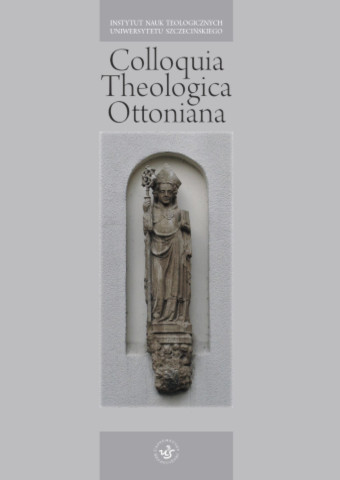
ISSN: 1731-0555
eISSN: 2353-2998
OAI
DOI: 10.18276/cto.2016.1-11




Issue archive /
1/2016
Ontyczny wymiar życia ludzkiego jako podstawa jedności i nierozerwalności małżeństwa
| Authors: |
Edward
Sienkiewicz
Wydział Teologiczny Uniwersytetu Szczecińskiego |
| Keywords: | unity woman man Trinity community covenant marriage |
| Data publikacji całości: | 2016 |
| Page range: | 18 (187-204) |
Abstract
The contemporary crisis of marriage and the family, manifesting itself in the instability of marriages, as well as the avoidance of their legalization is its announcement in the first chapters of Genesis. Just as it contained in their belief in the possibility of overcoming any crisis, on the unity and indissolubility of marriage. The basis, however, this must be ontological dimension, crucial for proper understanding of the human being by the special nature of the relationship of man to woman. Because at this level it has been distorted, and even broken by sin, also in this dimension opens up to the redemption. The unity of the spouses is not only the result of God’s creative activity, but also an image of His essence and image of the covenant concluded by God with man. This leads to the fullness of the Covenant – in the same sense complementing the unity of marriage – Jesus Christ in the Paschal Mystery. Contained in this way it enriches the New Covenant marriage, strengthening the unity proper to him, through Jesus Christ revealed in the mystery of the Trinity. Taking upon Himself human nature of the Son of God, also remaining in communion with the Father, determines the unity of man and woman the way for the unity of the right People of God. The fully realize it in eschatology. However, already in the temporal unity of the spouses may be a way for the revelation of God the mystery of his inner life. Like the marriage, Christian is an image of Christ’s love for the Church.
Download file
Article file
Bibliography
| 1. | Arnold B.T., Ehoi J.H., A Guide to Biblical Hebrew Syntax, Cambridge 2003. |
| 2. | Bartnicki R., Poglądy na małżeństwo w początkach ery chrześcijańskiej, w: M. Ozorowski, W. Nowacki (red.), Rodzina drogą Kościoła. Księga Jubileuszowa na 25-lecie posługi pasterskiej Biskupa Łomżyńskiego Stanisława Stefanka, Łomża 2005. |
| 3. | Bieleń R., Duszpasterstwo rodzin we współczesnej Polsce, Lublin 2001. |
| 4. | Botterweck G.J., Ringgren H., Fabry H.J., Theological Dictionary of the Old Testament, Grand Rapids–Cambridge 1977–2006. |
| 5. | Brichto H.Ch., The Names of God, New York 1998. |
| 6. | Bruni L., Rodzina: praca i świętowanie w świecie współczesnym, tłum. S. Biały, „Sprawy Rodziny” 1 (2012) 97, s. 51–62. |
| 7. | Clines D.J.A. (ed.), The Dictionary of Classical Hebrew, t. I–VI, Sheffield 1993–2007. |
| 8. | Dudziak U., Być kobietą w obecnych czasach, w: T. Paszkowska (red.), Mulieris dignitas. Promieniowanie kobiecości, Lublin 2009. |
| 9. | Epos o Gilgameszu, tłum. K. Łyczkowska, Warszawa 2002. |
| 10. | Franciszek, Evangelii gaudium, Rzym 2013. |
| 11. | Frevert U., Mąż i niewiasta. Niewiasta i mąż. O różnicach płci w czasach nowoczesnych, tłum. A. Kopacki, Warszawa 1997. |
| 12. | Garcia Lȯpez F., Il Pentateuco, Brescia 2004. |
| 13. | Gilgamesz, tłum. K. Łyczakowska, w: Epos o Gilgameszu, Warszawa 2002. |
| 14. | Jacob B., Das Buch Genesis, Stuttgart 2000. |
| 15. | Jan Paweł II, Familiaris consortio, Rzym 1981. |
| 16. | Jan Paweł II, List do Rodzin, Rzym 1994. |
| 17. | Katechizm Kościoła Katolickiego, Poznań 1994. |
| 18. | Lemański J., Księga Rodzaju. Rozdziały 1–11, w: A. Paciorek, R. Bartnicki, A. Tronina (red.), Nowy komentarz biblijny – Stary Testament, Częstochowa 2013. |
| 19. | Majkowski W., Czynniki dezintegracji współczesnej rodziny polskiej, Kraków 1996. |
| 20. | Majkowski W., Małżeństwo na próbę, w: E. Ozorowski (red.), Słownik małżeństwa i rodziny, Warszawa–Łomianki 1999. |
| 21. | Mazur J., Feminizm, w: Jan Paweł II, Encyklopedia nauczania społecznego, red. A. Zwoliński, Radom 2003. |
| 22. | Ozorowski E., Małżeństwo w historii zbawienia, w: E. Ozorowski (red.), Słownik małżeństwa i rodziny, Warszawa–Łomianki 1999. |
| 23. | Pachciarek P., Grabner-Haider A. (red.), Praktyczny słownik biblijny, tłum. T. Mieszkowski, Warszawa 1994. |
| 24. | Pawłowski Z., Opowiadanie, Bóg i początek, Teologia narracyjna Rdz 1–3 (Rozprawy i Studia Biblijne 13), Warszawa 2003. |
| 25. | Romaniuk K., Małżeństwo i rodzina według Biblii, Warszawa 1994. |
| 26. | Sarmiento A., Małżeństwo chrześcijańskie. Podręcznik teologii małżeństwa i rodziny, Kraków 2002. |
| 27. | Schneider T., Znaki bliskości Boga. Zarys sakramentologii, tłum. J. Tyrawa, Wrocław 1995. |
| 28. | Schüle A., Der Prolog der hebräischen Bibel. Der literar und theologiegeschichtliche Diskurs der Urgeschichte (Genesis I–II), Zürich 2006. |
| 29. | Ska J.L., La structure du Pentateuque dans sa forme canonique, „Zeitschrift für die alttestamentliche Wissenschaft” 113 (2001), s. 330–352. |
| 30. | Stefanek S., Rodzina – komunia osób, w: E. Ozorowski (red.), Słownik małżeństwa i rodziny, Warszawa–Łomianki 1999. |
| 31. | Sternberg M., The Poetics of Biblical Narrative. Ideological Literature and the Drama of Reading, Bloomington 1987. |
| 32. | Szewczyk W., Wyzwolić w rodzinach siły dobra, w: M. Ozorowski, W. Nowacki (red.), Rodzina drogą Kościoła. Księga Jubileuszowa na 25-lecie posługi pasterskiej Biskupa Łomżyńskiego Stanisława Stefanka, Łomża 2005. |
| 33. | Szymczak J.S., Sakrament małżeństwa drogą wzrostu Kościoła, Łomianki 2001. |
| 34. | Westermann C., Theologie des Alten Testaments in Grundzügen, Göttingen 1995. |